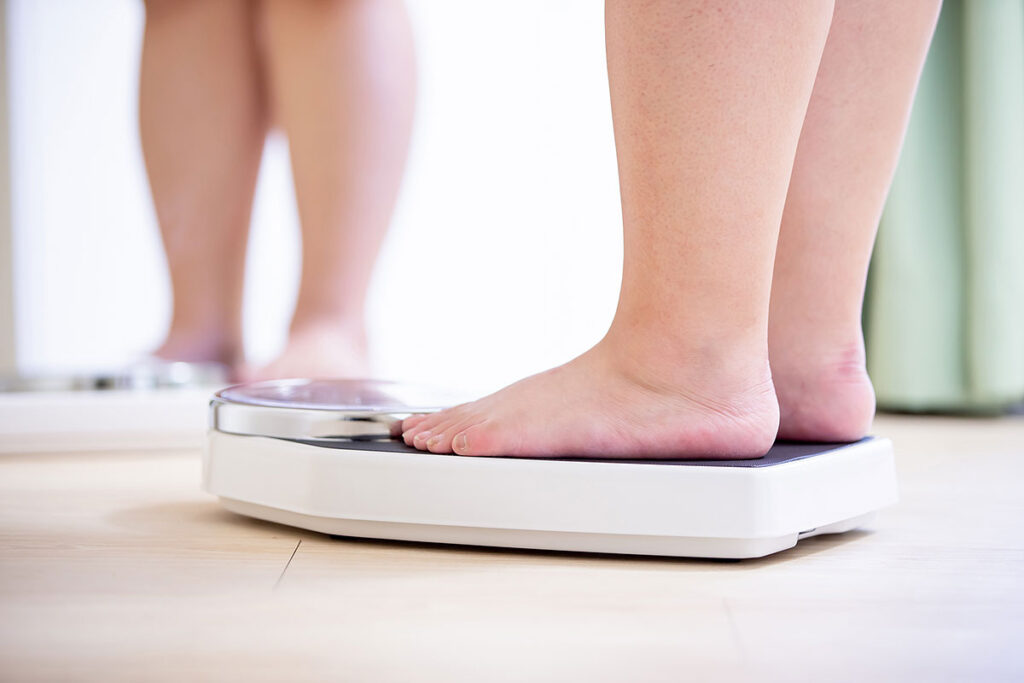Coping with Obesity

Along with the many health issues caused by the pandemic, our nation’s obesity problem has worsened. Stress, sleep issues, and coping mechanisms have increased our consumption of comfort foods. Sedentary lifestyles became common as all ages were forced to limit typical daily activity (like getting dressed and moving beyond the living room).
As we replace cozy elastic-waist pants and oversized sweatshirts with summer attire, the reality of our COVID-19 hibernation may be difficult to, uh, tug over the hips. With “leisure suit” redefined (leggings and a blazer for video meetings), we need to take action.
Achieve & Maintain a Healthy Weight
Think long-term commitment to accomplish your optimum healthy weight. Ignore new diet trends and fitness crazes. They are often impossible to maintain. Instead, focus on creating a healthier lifestyle. Take small but consistent steps that are manageable.
• Aim to increase physical activity in short increments over a set period of time. This won’t be difficult considering many binged Netflix all winter.
Idea: Try a daily 20-minute walk. Increase it by 10 minutes over a month.
Add to your step count in our Great Outdoors Activity Finder:
• Create a fitness routine. Beyond adding physical activity (like walking the dog or washing your car), a formal routine should include cardio exercise as well as resistance training. Of course, check with your healthcare provider before undertaking strenuous workouts.
Idea: Find exercises you enjoy. Think beyond the treadmill. Consider dancing, basketball, and bicycling. Or take up gardening and enjoy the health and social benefits of a green thumb.
• Swap out unhealthy food choices for healthier versions.
Idea: Replace one soda a day with a glass of water with fresh lemon or gradually eliminate the sugar in your morning brew.
• Add veggies to your meals.
Idea: Replace a buttered roll with sliced fresh peppers. Replace the bacon in your omelet with low-fat cheese and spinach.
• Stay hydrated. Thirst is often mistaken for hunger.
Idea: Carry a water bottle with you throughout the day. Monitor fluid intake. Avoid sugary beverages. Don’t drink your calories! The occasional cookie is more fun.
• Keep track of your caloric intake, especially compared to activity output.
Idea: Try journaling everything you eat, small noshes and big meals. Include the random piece of candy and leftover fries you finished off your kid’s plate. Note how much you mindlessly consume. Consider when you’re eating it, why, and how much activity you are getting to counteract it.
Maintain this food/activity journal to learn patterns. Later, you can mentally track this without needing to continue written lists, although they may help.
Our Beautiful Children
Parents get a twofer by following the ideas shared here. Their exemplary behavior is the best way to raise healthy kids. Start earlier, when you’re still their superhero and they are most impressionable.
Teens can learn from you as well, especially behaviors not to mimic. Weight issues can cause numerous health problems, including type 2 diabetes, cardiac illnesses, liver problems, depression, and joint pain. Older children may not be as receptive to parental advice, but they can easily make the connection between weight problems and illness.
Focus on Health, Not the Scale
• Never criticize a child about their body weight. Encourage them to see their beauty and self-worth.
• Keep healthful snacks within an easy grab. Make them kid-friendly: carrots with dip, apple with peanut butter, raisins, prewashed fruit, cheese sticks, and low-fat yogurt. Don’t keep a lot of junk food in the house.
• Do not have soda in the house. Limit juice to 100-percent fruit ingredients; only allow once daily, if at all.
• Reward with meaningful experiences, not food. For example, treat a test’s high score with a movie night rather than an ice cream outing.
• Use a brisk walk around the neighborhood to cope with the blues rather than a plate of chips or cookies. (Note: Teen breakups and such may require a chocolate splurge or homemade cookies. Sometimes, you just have to.)
• Enjoy an active lifestyle. Avoid having the TV running and video games streaming. The pandemic might have established some bad habits. Warm weather is here. Spend time outside. Get reacquainted with nature. (Has your parenting become a victim of electronics? Reassert your authority: Power down the modem!)
• Help kids find their passion. Sports, dance, gymnastics, and other fun hobbies help maintain a healthy weight and high confidence. There’s so much to explore.
Meanwhile, let’s all suck in our collective pandemic gut. It’s time to pull on clothes from the pandemic’s beginning over a year ago. Let’s get healthier!
